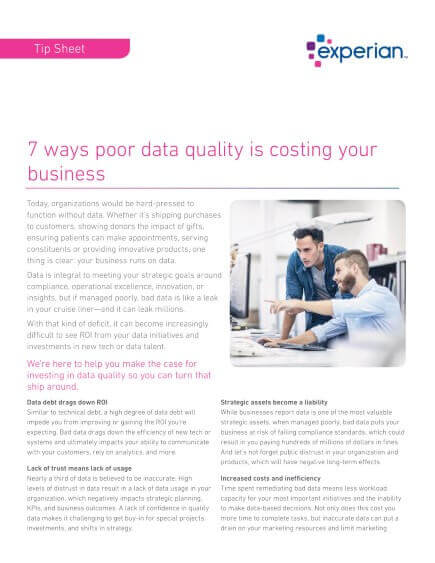- Products

Enjoy a free 30-day trial of our
data validation software.Experience the power of trusted data
solutions today, no credit card required! - Solutions

Enjoy a free 30-day trial of our
data validation software.Experience the power of trusted data
solutions today, no credit card required! - Partners

Enjoy a free 30-day trial of our
data validation software.Experience the power of trusted data
solutions today, no credit card required! - Learn more
- Pricing
- Contact Us
7 ways poor data quality is costing your business
Today, organizations would be hard-pressed to function without data. Whether it’s shipping purchases to customers, showing donors the impact of gifts, ensuring patients can make appointments, serving constituents or providing innovative products, one thing is clear: your business runs on data.
Data is integral to meeting your strategic goals around compliance, operational excellence, innovation, or insights, but if managed poorly, bad data is like a leak in your cruise liner—and it’s leaking millions. According to Gartner, poor data quality can cost organizations up to $15 million annually.
With that kind of deficit, it can become increasingly difficult to see ROI from your data initiatives and investments in new tech or data talent.
We’re here to help you make the case for investing in data quality so you can turn that ship around.
1. Data debt drags down ROI
Similar to technical debt, a high degree of data debt will impede you from improving or gaining the ROI you’re expecting. Bad data drags down the efficiency of new tech or systems and ultimately impacts your ability to communicate with your customers, rely on analytics, and more.
2. Lack of trust means lack of usage
Nearly a third of data is believed to be inaccurate. High levels of distrust in data result in a lack of data usage in your organization, which negatively impacts strategic planning, KPIs, and business outcomes. A lack of confidence in quality data makes it challenging to get buy-in for special projects, investments, and shifts in strategy.
3. Strategic assets become a liability
While businesses report data is one of the most valuable strategic assets, when managed poorly, bad data puts your business at risk of failing compliance standards, which could result in you paying hundreds of millions of dollars in fines. And let’s not forget public distrust in your organization and products, which will have negative long-term effects.
4. Increased costs and inefficiency
Time spent remediating bad data means less workload capacity for your most important initiatives and the inability to make data-based decisions. Not only does this cost you more time to complete tasks, but inaccurate data can put a drain on your marketing resources and limit marketing effectiveness.
5. Barrier to adopting emerging tech
Top investments like predictive analytics and artificial intelligence rely on quality data. Inaccurate, incomplete, or irrelevant data will result in delays or a lack of ROI. This is a major blocker to becoming data-driven, which puts you at a competitive disadvantage.
Explore our guide to craft a business case for data quality
Learn more
7. Bad customer experience
Running your business on bad data can result in growing customer frustration, delays, and increased complaints, which negatively impacts your ability to cross-sell, upsell, and maintain your customer base. Their dissatisfaction directly results in lost revenue, and negative reviews are likely to damage your company’s image and reputation.
There’s a solution: Data quality is both tangible and measurable, and it has a direct impact on business revenue. Data quality management tools can easily address the costliest data quality issues stifling your organization’s growth, efficiency, and innovation. Capabilities such as profiling, standardizing, cleansing, matching, enriching, and monitoring help you understand and correct flaws in data so you can drive effective information governance across operational business processes and decision-making.
